The Fascinating Appeal of Pet Birds and Their Care
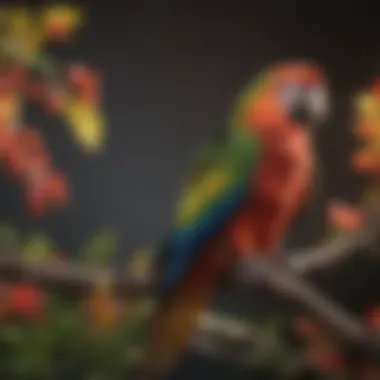
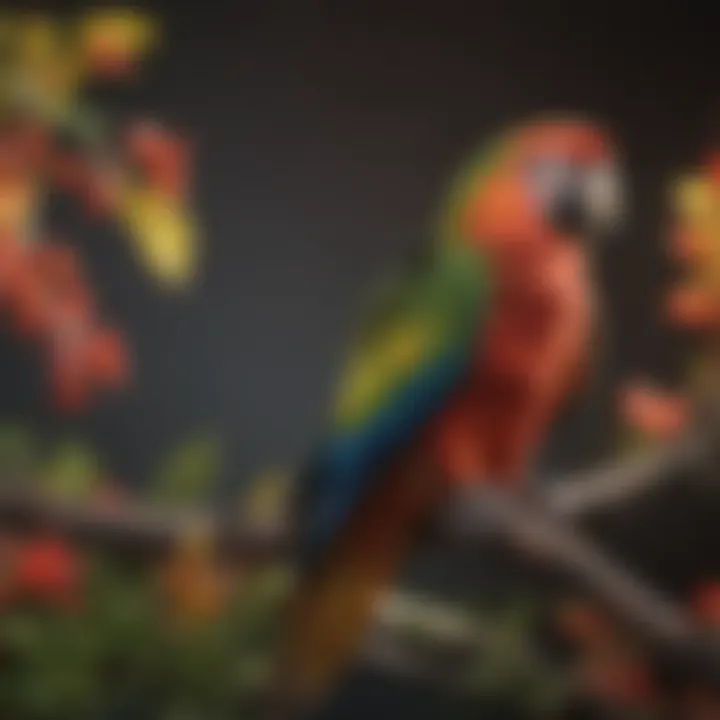
Intro
The world of pet birds is not just an array of feathers and beaks; it is a fascinating tapestry woven with rich colors, remarkable sounds, and engaging behaviors. Birds can fit seamlessly into a variety of lifestyles and homes, capturing hearts with their charming antics and melodious songs. As companions, they often offer an understanding that transcends the conventional boundaries of pet ownership. This article plunges into the allure of pet birds, elaborating on their distinctive attributes, the companionship they foster, and the nuances of their care.
Pet birds range from small parakeets to majestic macaws, each with its own personality and quirks that add unique flavor to a household. With the right knowledge and understanding, you can pave the way for a fulfilling relationship with your avian friend. As we explore topics from essential care to social interactions and health, both seasoned owners and newcomers will find something valuable and enlightening in this discussion. Spoiler alert: we’ll also dispel some common myths that may cloud your perception of these captive wonders.
Let's spread our wings and take a look at the fundamentals that underpin the care for these splendid creatures.
Avian Care Basics
Caring for pet birds is a responsibility based on understanding their unique needs. Recognizing that these pets require more than just a seed and a cage is crucial for fostering a happy and healthy bird.
Importance of Proper Nutrition
Just like humans, birds thrive on a balanced diet. A variety of seeds, fruits, vegetables, and pellets should be included in their daily meals to ensure they receive necessary nutrients. Each species may have specific nutritional requirements. For instance, a cockatiel may enjoy a mix of seeds and leafy greens, while a parrot might need a different balance to maintain its vibrant plumage.
Understanding Bird Species and Their Needs
It's essential to know that not all birds are created equal. Budgerigars are energetic and can entertain for hours, whereas a quieter finch might prefer a cozy corner and gentle tunes. Familiarizing yourself with your bird's species—be it a lovebird, canary, or a conure—offers insights into their behavior and care needs, and paves the way for a more harmonious relationship.
Basics of Birds Habitat Setup
Creating an inviting habitat is the cornerstone of avian care. A spacious cage with adequate perches, toys, and hiding spots can make a world of difference. Remember to utilize safe materials in the construction of their habitat. A cage that mimics their natural environment not only provides safety but also enhances mental stimulation.
Grooming and Hygiene Tips
Regular grooming keeps your feathered friend looking sharp. Bathing can be an enjoyable ritual, often leading birds to enjoy splashing around or preening. To maintain hygiene, regularly clean their habitat, change water, and check their feathers for any signs of matting. Incorporating these simple practices results in a healthier bird that is both mentally and physically content.
Interacting with Your Pet Bird
Building a relationship with your new buddy goes beyond feeding and cleaning; it's about interaction and communication. Establishing trust takes time and patience, and the joy that comes with this bond is immeasurable.
Building Trust and Connection
Begin with gentle interactions. Let your bird get used to your voice and presence. A consistent routine fosters familiarity. Offering treats from your hand might help bridge that gap, establishing a sense of safety and comfort.
Training Techniques and Tips
Training your bird isn't just beneficial for your peace of mind; it's fun too! Using positive reinforcement, like treats and praise, helps in teaching commands. Start with simple tricks, gradually moving on to more complex tasks. The key is consistency; over time, your bird will likely surprise you with its learning ability.
Fun Activities for Bird Owners and Their Birds
Engaging activities not only keep your feathered friends entertained but can also strengthen your bond. Try creating obstacle courses with toys or teaching them to talk. Birds, being naturally curious and playful, will thrive on such mental stimulation.
Recognizing Bird Cues and Behaviors
Birds exhibit various behaviors to communicate their feelings. Understanding these cues is imperative. For instance, raised feathers may indicate excitement, while a puffed-up stance might mean the bird is feeling unwell. Learning the signs can help you respond effectively to their needs.
Emotional Well-Being of Birds
Caring for a pet bird isn't solely about physical health; their emotional well-being is equally important. A flying companion deserves an environment that promotes happiness and engagement.
The Role of Play and Socialization
Interaction with their human and other pets is vital. Daily playtime, coupled with social talks, keeps your bird mentally stimulated. Organizing playdates with other birds can also offer crucial social benefits.
Enhancing Birds' Emotional Health
To keep your bird emotionally balanced, provide opportunities for exploration and sensory engagement. Activities like foraging, where birds search for hidden treats, offer them joy and a sense of accomplishment, enhancing emotional health.
Assessing Bird Stress and Remedies
Like humans, birds can experience stress. Changes in living conditions, lack of interaction, or illness may contribute to this. Observing your bird’s behavior can help detect stress early on. If signs are evident, taking measures like reducing environmental stressors and ensuring comfort is paramount.
Building Strong Human-Bird Bonds
Trust is the bedrock of a robust relationship. Spend time with your pet daily, talk gently, and engage with them. Overtime, the bond will deepen, perhaps into a friendship that rivals that of any other pet.
Bird Health and Safety
A bird's health warrants ongoing attention. Prompt responses to issues that arise can mean the difference between a minor ailment and a serious concern.
Common Health Issues and Prevention
Birds can face several health issues, from feather plucking to respiratory problems. Maintaining clean living conditions, a balanced diet, and regular check-ups can assist in keeping many of these illnesses at bay.
Routine Veterinary Care
Finding a veterinarian who specializes in avian care is an essential step. Regular check-ups can catch problems before they escalate, ensuring your feathered friend stays healthy and happy.
Environmental Hazards to Avoid
Certain household items are harmful to birds, such as toxic plants, non-stick cookware, and aerosol sprays. Being aware of these hazards and removing them can prevent dire consequences.
Signs of Illness or Distress
Recognizing illness or distress in birds involves keeping an observant eye on their daily habits. Changes in appetite, behavior, or droppings can signify an underlying issue that may require immediate attention.
Fun Facts and Quirky Insights
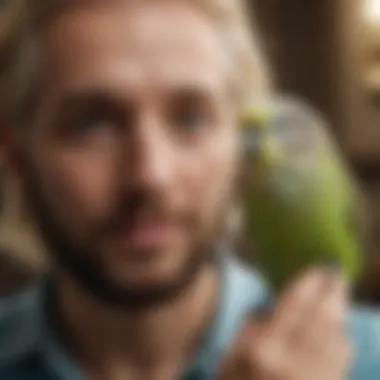
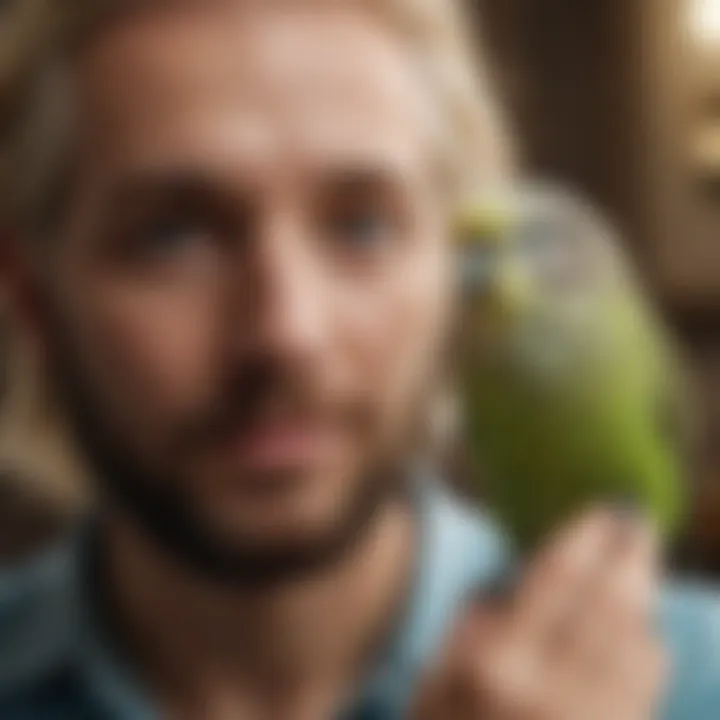
The realm of pet birds is filled with quirky traits and captivating traditions. Knowing some fun facts can not only be entertaining but can also enhance your appreciation for these unique pets.
Unique Traits of Popular Bird Species
For instance, did you know that African Greys are touted for their intelligence and ability to mimic human speech? Or that canaries have been historically used in coal mines as indicators of airborne toxins?
Historical and Cultural Significance of Birds
Birds have played significant roles in various cultures—symbolizing freedom, hope, and even guidance in different mythologies. Their presence in art, literature, and spiritual practices speaks volumes of their impact across centuries.
Famous Bird Owners and Their Stories
Well-known personalities like John Lennon and his beloved budgie, or even the mesmerizing stories of Barbara Walters with her exotic birds, serve as a reminder of the deep connections some share with these companions. These anecdotes not only entertain but also enlighten us about the bonds created with birds.
“Birds have a way of inducing human feelings that were thought to be exclusively cultivated in human environments.”
With this knowledge in hand, potential and current pet owners can start navigating the enchanting world of avian friendships, armed with the information and insights necessary for meaningful companionship.
Understanding the Unique Appeal of Pet Birds
Birds have held a special place in human hearts for centuries. Their vibrant colors, melodic songs, and lively personalities contribute to their charm. This section explores why pet birds are so captivating and the invaluable benefits they bring to our lives. By understanding their appeal, we can better appreciate these avian companions and our shared responsibility toward them.
The allure of pet birds goes beyond their aesthetic appeal. They can act as stress relievers, companions, and even playful entertainers. Studies have shown that interacting with birds can lower blood pressure and reduce anxiety, making them an ideal addition to many homes. The sound of a chirping bird or the sight of a bird preening can bring a sense of calmness that many seek in today’s fast-paced world.
In managing the responsibilities that come with pet ownership, we discover various considerations. From habitat setup to nutritional needs, understanding these elements ensures that we can provide the best care. Moreover, bird ownership demands more than just feeding and cleaning; it calls for an appreciation of their needs for socialization, mental stimulation, and exercise. This deeper knowledge not only strengthens our connection with them but also enriches the bird’s overall quality of life.
A Brief History of Birds as Companions
The companionship of birds dates back to ancient civilizations. Egyptians revered sacred birds, while Chinese monarchs kept songbirds as a display of status. The fascination with birds continued through the Middle Ages, when they were symbols of freedom and fidelity. Over time, species such as parrots and canaries became popular in households, which formed a bond with humans that transcended short-term interest.
In more modern times, bird ownership evolved into an appreciation of diverse species, each offering unique traits and behaviors. People started recognizing the emotional connections they could form with these creatures, as more families began to bring pet birds into their homes.
Cultural Significance of Pet Birds
Birds have not only found a prominent place in our homes but also within various cultures around the globe. In many societies, they symbolize freedom and the spirit of nature. The tradition of keeping songbirds, for instance, is celebrated in numerous cultures for the joy of their songs and the beauty they bring to life.
Many cultures have incorporated birds into their art, folklore, and rituals. For example, in Japanese culture, the crane is a symbol of peace and longevity, while the Native American tribes regard the eagle as a powerful spiritual messenger. Each bird carries significance, affirming the special connection humans have to these creatures.
"Birds present a fascinating insight into our own strengths and fears, much like a mirror reflecting our desires for liberty and companionship."
In summary, the unique appeal of pet birds lies in their rich history, cultural significance, and the deep emotional bonds they foster. Understanding these elements helps illuminate the role that pet birds play not only as companions but also as symbols in our lives. Engaging with these avian friends not only enriches our days, but also encourages a commitment to ensuring their health and happiness.
Diverse Species and Their Distinct Features
Understanding the different species of pet birds is crucial for potential bird owners or enthusiasts. Each type presents its own unique characteristics, habits, and care requirements. Knowing these specifics helps in selecting the right bird match for an individual or familial environment. Plus, learning about these species offers deeper insights into their behavior, which can enhance the bond you can form with them.
Bird lovers often find joy in observing how distinct personalities shine through each species. Furthermore, being aware of the specific needs of various birds can ensure a healthier and happier life for your feathered companions.
"Birds may not be able to say ‘I love you,’ but they express their emotions in ways that people can feel deeply."
Small Birds: Budgies and Lovebirds
Among the small bird category, Budgerigars, commonly referred to as budgies, and lovebirds are quite celebrated. Budgies are particularly popular due to their friendly nature and vibrant colors. They are generally easy to care for and can be incredibly social, often bonding closely to their owners. A mix between playful and curious, these little birds can learn a variety of sounds and even mimic human speech. It isn't unusual to find budgies engaging in friendly chatter or simply enjoying their time with their human companions.
Lovebirds, on the other hand, are often noted for their affectionate behavior. These birds thrive on companionship, often forming strong bonds not just with their kind but also with the humans around them. They can be energetic and cheerful, filling a space with life. However, they can sometimes be a tad territorial. It's wise to give them their own space when they need it! Each species offers distinct traits; hence getting to know their nuanced behaviors can create rewarding relationships.
Medium-Sized Birds: Cockatiels and Conures
Cockatiels are well-loved for their playful attributes. Their crested heads provide an endearing touch as they display a range of emotions through their crest positions. These birds can be excellent companions, as they tend to be more laid-back and enjoy human interaction. Cockatiels can also be trained to whistle tunes and often have lovable, silly antics that make them endearing friends.
Conures are another medium-sized option, and they bring a different flavor to bird ownership. Their lively personality and vibrant feathers are a feast for the eyes. Known for their vocal abilities, conures can be quite the talkers, often producing a variety of sounds and calls. They tend to be more animated and spirited, so potential owners should be prepared for an energetic pet that thrives on attention and social engagement.
Large Birds: Parrots and Macaws
When it comes to larger bird species, parrots and macaws stand out. Parrots are celebrated for their intelligence and social nature. Many parrot species exhibit superb mimicry skills and can imitate words and phrases, sometimes impressing even their seasoned caretakers. Their colorful plumage and ability to bond emotionally draw many to them. It is essential to note that while they can make fantastic companions, they also demand a lot of time and mental stimulation.
Macaws, on the other hand, are known for their striking beauty and larger-than-life personalities. They require even more care and space due to their size and social behavior. They typically thrive in flourishing environments rich with enrichment activities. If you’re eyeing a macaw, be prepared for a significant commitment in terms of space, care, and companionship.
Ultimately, selecting the right bird comes down to an understanding of these distinct features and behaviors. Each type of bird has its charms and challenges, making the journey in aviculture both exciting and rewarding.
The Emotional Bond Between Birds and Their Owners
When you share your life with a pet bird, it often begins a journey unlike any other. These feathery companions are not just pets; they can become beloved members of your family, setting the stage for surprisingly deep emotional connections. This bond is pivotal, forming the essence of why many choose to welcome a bird into their lives. Understanding how this emotional link builds and flourishes can enrich the experience for both the bird and the owner.
Understanding Bird Behavior and Communication
Birds are incredibly expressive creatures. Their way of communicating can invite you into a world of subtle yet profound interactions. Understanding this behavior is key to nurturing a bond. For instance, vocalizations are a primary means through which birds express themselves. From cheerful chirps to soft trills, each sound can convey a different message. Observing your bird’s body language is equally important; the tilt of their head, spread of their wings, or even a head bob can reveal their feelings.
Here are some natural behaviors that signify an emotional bond:
- Preening: When a bird preens you or itself in your presence, it’s a sign of trust and affection. It mirrors how they would care for their mates in the wild.
- Fluffing Up: A bird that feels secure may puff up its feathers, indicating comfort and relaxation in your company.
- Mimicking: Birds often mimic sounds they hear repetitively. This can either be your voice or household noises. It’s their way of showing they are engaged and interested.
Understanding these cues helps foster a more profound connection. It tells you what makes your bird tick—what it enjoys, what intrigues it, and what might even cause stress.
The Attachment Process: Building Trust
Building trust with a pet bird takes time and patience, but the rewards are immeasurable. The process often begins with simple, consistent interactions. For many birds, their instinct may be to be cautious around humans. Therefore, taking the time to engage with them in a stress-free setting can lay the groundwork for trust.
Here are some steps to enhance this attachment process:
- Patience is Key: Allow the bird to come to you on its own terms. Forcing interactions can lead to fear rather than bond.
- Create a Routine: Birds thrive on routine. Try to feed them or interact at the same time each day. This predictability can foster a sense of security.
- Gentle Voice Techniques: Use a calm, soft voice when speaking to your bird. Over time, they’ll associate your voice with comfort, making them more likely to trust and engage with you.
- Offer Treats: Positive reinforcement can be a useful tool. Offering a favorite snack as a reward for approaching you can accelerate the trust-building process. Just be mindful of the amount!
- Observe and Adapt: Each bird has its unique set of quirks and preferences. Pay attention to its likes and dislikes and adapt your interactions accordingly.
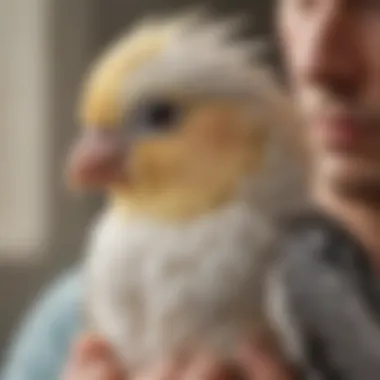
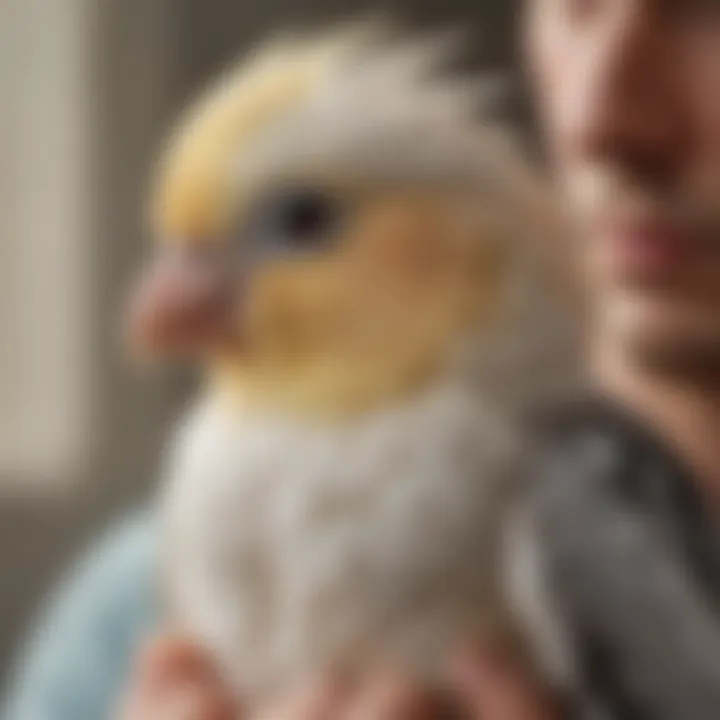
"Trust is like a fragile glass: once broken, it's hard to mend."
This quote can resonate in the context of bonding with birds; nurturing their trust can lead to an incredibly rewarding relationship.
As this emotional bond deepens, pet birds can become not just companions, but loyal friends who feel fully integrated into the fabric of daily life. Every interaction serves to strengthen the connection, providing both emotional support and the joy of companionship.
Care and Enrichment for Pet Birds
Taking excellent care of pet birds goes beyond feeding them and cleaning their cages. This section emphasizes the importance of creating a nurturing environment that fosters physical health and emotional well-being. Birds in captivity rely greatly on their owners to provide stimulating habitats and nutritional sustenance. Without proper care, they may exhibit behavioral issues or even suffer from health problems.
In the realm of pet birds, environmental enrichment is essential. This aspect not only involves the physical space where they live but also the toys, social interactions, and mental challenges their owners can implement. All of this combines to create a holistic setting for them to thrive.
Creating an Ideal Habitat
An ideal habitat is the foundation of a healthy life for a pet bird. Setting up a cage that mimics the bird's natural environment can lead to happier and more contented pets. The following elements should be considered when designing their living space:
- Cage Size: It’s often said that bigger is better, and this rings true in housing birds. A larger cage provides room for them to move around and stretch their wings. The general recommendation is to choose a cage that is at least twice the wingspan of the bird.
- Perches and Toys: Different textures and heights in perches will keep their feet healthy and reduce boredom. Natural wood perches, rope perches, and swings can encourage play. Rotate toys regularly to ensure that curiosity stays piqued.
- Safe Spaces: Various areas within the cage, like cozy hiding spots, allow birds to feel secure. Birds, much like us humans, need personal space to relax and recharge.
- Hygiene: Clean the cage regularly to prevent disease. A clean environment not only removes droppings and uneaten food but also limits parasites that thrive in dirt.
"A well-established habitat will encourage the more natural behaviors of birds which contributes to their overall health and happiness."
Nutrition: A Key to Health and Longevity
Nutrition plays a crucial role in maintaining a bird’s health. Providing a diet that is as close to their natural food will help ensure they remain vibrant and active. Here are important factors to consider for your bird’s diet:
- Balanced Diet: Many birds thrive on a mix of seeds, pellets, fruits, and vegetables. For instance, seeds are often high in fat. Pellets can offer balanced nutrition in a single form. It’s wise to consult an expert to ascertain the correct ratio of these foods suitable for specific species.
- Fresh Produce: Incorporating fresh fruits and vegetables enriches their diet with vitamins. Leafy greens, carrots, and apples can become a delightful treat. Just ensure to wash them thoroughly to remove any pesticides.
- Hydration: Clean and fresh water should be available at all times. Birds can be picky about their water, so regular changes are critical to ensure they drink enough.
- Special Diets for Health Issues: For birds facing health issues, specialized diets might be necessary. Consulting an avian vet can help in tailoring a diet plan according to their unique health needs.
Taking the time to understand how to set up a proper living environment and provide the right nutrition can significantly improve the quality of life for pet birds. By investing in their well-being today, you set the stage for a long-lasting, joyful companionship.
Training and Behavioral Development
Training is not just about teaching a bird to do tricks; it's about building a relationship based on trust and understanding. The development of a bird’s behavior can significantly affect its comfort and happiness in a domestic setting. Understanding why training is essential becomes clearer when we see the mutual benefits it brings for both the bird and the owner. By focusing on routine training, an owner can promote the overall well-being of their pet bird, resulting in less stress and a more harmonious living environment.
The intricacies of bird behavior can be quite fascinating. Unlike many other pets, birds communicate and react differently. Observing and responding to their body language and vocalizations is crucial in creating a training plan that will yield positive results. Furthermore, knowing how to engage your bird’s natural instincts is essential for effective behavioral development.
Incorporating behavioral development into your bird care routine ensures that both physical exercise and mental stimulation are prioritized. A well-trained bird can avoid many behavioral issues such as biting or screaming. Therefore, understanding how to train and socialize a pet bird not only feeds into their needs as social creatures but allows them to thrive in their environments.
Positive Reinforcement Techniques
Positive reinforcement is a training method that has proven effective through its use of reward-based systems. When a bird performs a desired action, it is rewarded with something it enjoys, like a treat, praise, or even toys. This motivates them to repeat the behavior in the future.
- Timing is key: Deliver rewards immediately after the desired action. This helps the bird make a clear connection between the action and reward.
- Consistency matters: Use the same commands and rewards each time. This reduces confusion and strengthens learning.
- Patience is vital: Birds learn at their own pace. Fluctuating expectations could lead to frustration. Allow the bird time to adapt to new skills.
Implementing these methods has shown success in many cases. Owners have seen significant improvements in their birds’ willingness to participate in interactive activities. The adoption of positive reinforcement not only builds skills—it fundamentally shapes the overall bond.
"Training is not just about submission; it’s about collaboration and connection."
Understanding and Managing Aggression
Birds are more than feathered companions; they can also exhibit fascinating, yet challenging, behaviors. Inevitably, there may be times when aggression arises. Understanding the root causes of these behaviors is essential.
Common triggers for aggression can include:
- Hormonal changes: Birds may behave differently during breeding seasons. This period can lead to increased territoriality.
- Fear: Sudden movements or loud noises can provoke a response. Recognizing these stimuli is helpful for the owner.
- Inadequate socialization: Birds that are not regularly handled can become fearful or defensive.
To manage aggression effectively, an owner must stay calm and not react angrily. Redirecting the bird’s attention using toys or changing their environment can help. Additionally, providing a safe space where they feel secure allows them to calm down. A thorough understanding of bird body language will inform the owner when to step back, and it will outline the right approach when training resumes.
In summary, training and behavioral development serve critical roles in guiding each pet bird toward a peaceful and settled existence. By applying techniques that foster understanding and connection, owners can navigate the complexities of their birds’ behaviors effectively.
Common Misconceptions About Pet Birds
Understanding the common misconceptions about pet birds is essential in fostering proper care and appreciation for these unique companions. Many prospective bird owners often hold misconceptions that can lead to poor decisions affecting the birds' well-being. A better grasp of these myths helps in creating a more nurturing environment for them.
One frequent misunderstanding is the belief that birds, particularly parrots, are just like furry pets. This is far from the truth. Birds have intricate social needs and behaviors that need to be understood in order to ensure they thrive. Every species has its specific requirements, and neglecting them may lead to stress or behavioral issues.
Social Needs vs. Independence
It's common for people to think that pet birds are independent creatures that can thrive on their own, similar to cats or fish. However, birds are highly social animals. Many species, especially parrots, develop strong bonds with their owners and require consistent interaction to feel secure.
Birds often engage in social behavior that mirrors what they would encounter in the wild. This includes preening one another and vocalizing to maintain connections. When they are neglected or not given enough attention, they may exhibit signs of distress, such as excessive screaming or feather plucking.
- Recognizing Social Needs:
- Regular interaction is key.
- Birds need mental stimulation and socialization.
Conversely, while birds do enjoy the company of their humans, they also need personal space. Owners should find a balance, understanding that a bird will flourish when they feel secure enough to explore their surroundings independently.
Birds in Captivity: Freedom vs. Safety
Another prevalent myth surrounds the idea that pet birds are cruelly imprisoned in cages. While it is true that birds have more natural liberty in the wild, captivity can provide safety from predators, diseases, and environmental dangers. The challenge lies in ensuring these birds still experience as much freedom as possible within responsible boundaries.
A well-designed environment is critical. Birds should not be kept in cages that are too small or devoid of enrichment activities. Rather than thinking of a cage as constricting, it could be viewed as a sanctum—a safe haven where they can relax, provided it's coupled with time outside of the cage under supervision.
Important Considerations
- Safety of Birds in Captivity:
- Creating a Balanced Life:
- Protection from external threats.
- Disease prevention through controlled environment.
- Regular opportunities for supervised flight or exploration outside the cage.
- Variety of toys and mental challenges to stimulate.
"Birds thrive with the right balance of safety and freedom, allowing their spirits to soar while remaining protected in a nurturing environment."
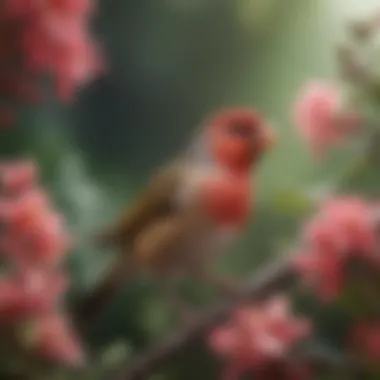
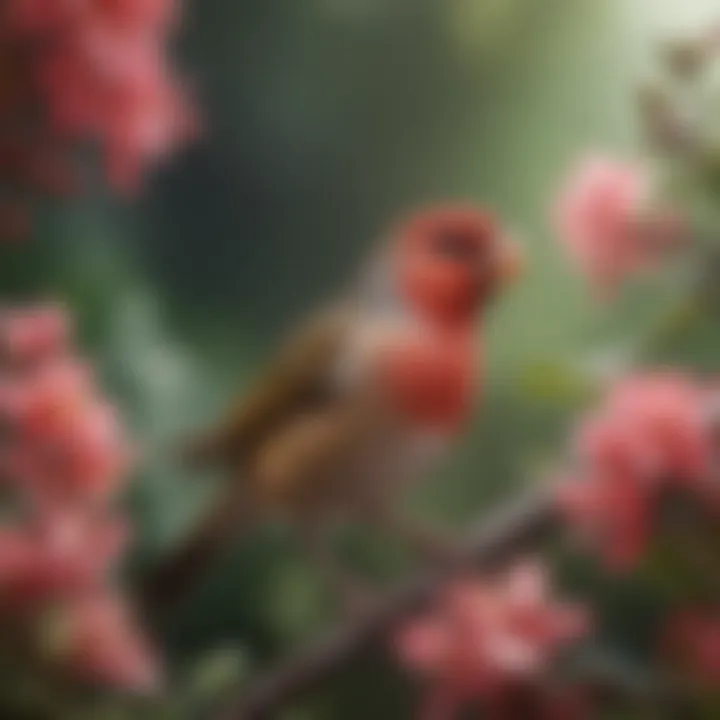
In summary, misconceptions can lead to a myriad of issues regarding the care and understanding of pet birds. By laying to rest these false ideas, one can pave the way for healthier and more fulfilling relationships with these fascinating creatures.
The Joy of Unique Personalities in Birds
Pet birds are not just pets; they cherish their own personalities that can enchant and surprise any bird lover. The unique traits of different species contribute to the joy of owning birds, making them engaging companions. Understanding their varied behaviors and quirks adds depth to the relationship. Each bird has its own character, just like people. It’s these personalities that often become central to the bond formed between the bird and the owner.
Identifying Traits in Different Species
Not every species of bird displays the same behavior. Recognizing the unique characteristics of different types helps in understanding and nurturing their needs.
For instance, budgies are often seen as playful and social, enjoying the company of their human friends. Their talkative nature can entertain for hours. On the other hand, cockatiels are known for their affectionate nature, often forming strong attachments to their humans, even mimicking their sounds or melodies.
Some of the distinct traits include:
- Budgies: Playful, vocal; they often engage with toys and enjoy ladders or swings.
- Cockatoos: Affectionate and often seek interaction; some can become quite chatty.
- Lovebirds: Bond closely with their owners but can be a bit more independent than budgies, displaying sweet behavior toward their mates.
- Parrots: Generally intelligent and require mental stimulation; they can have a variety of personalities ranging from playful tricksters to calm observers.
Recognizing these characteristics can help owners tailor their environments and interactions, enhancing the experience for both parties. Each personality traits can be heartwarming and, at times, quite surprising!
Stories of Quirky Bird Behaviors
Birds can sometimes act in unexpected ways, often showing personalities that genuinely defy the traditional image of an avian companion. For example, some owners share how their lovebirds become secretive little individuals, hiding in corners with precious toys.
Here are a few fun anecdotes about peculiar bird behaviors:
- Playful Mischief: One parrot named Coco has a habit of stealing small items around the house like keys or remote controls. His owner finds his sneaky tactics amusing, yet frustrating at times. Coco seems to take delight in the mini treasure hunts his owner embarks on every evening.
- Dance Offs: A cockatiel named Bella has learned to bob her head along to specific songs. Her owner reports that whenever they play Beatles tunes, Bella puts on a full dance display, making her the star of the household.
- Cuddle Champion: Then there’s Petey, a budgie with an uncanny ability to sense when someone is feeling down. He’ll nuzzle up to his owner softly, providing comfort, which showcases the emotional sensitivity birds can possess.
These stories not only provide amusement but also emphasize how birds can engage with their environments in ways we might not expect. A bird's unique personality and behavioral quirks often resonate well with their human companions, creating a delightful atmosphere in homes filled with companionship.
"Birds are not just living beings; they are friends that offer joy through their behavior and quirks that reflect their individual personalities, making every day with them a memorable adventure."
For bird owners, observing and acknowledging these unique traits adds layers to their bond and provides ample opportunities for shared experiences, discussions, and laughter within a community of avian enthusiasts.
The Role of Avian Veterinarians
Owning a pet bird brings immense joy, but it also comes with responsibilities, including ensuring their overall health and well-being. Avian veterinarians play a crucial part in this, as they specialize in the care and treatment of birds. Their expertise is irreplaceable when it comes to understanding the unique health needs of feathered companions. Without proper veterinary care, the likelihood of missed conditions that could be harmful to a bird increases significantly. They hold the key to not only diagnosing illnesses but also to fostering preventative care that can save lives.
Importance of Regular Check-Ups
Regular check-ups with an avian vet are essential for any pet bird owner. Just like humans, birds can be affected by a range of health issues that can go unnoticed until it’s too late. Routine visits help in catching these problems early on. Here are some reasons why these check-ups matter:
- Early Detection of Illness: Many diseases in birds can progress silently until they become severe. A regular check-up can catch these issues before they escalate.
- Monitoring General Health: A vet can perform basic health assessments, including weight checks and feather condition, which are critical indicators of overall well-being.
- Nutritional Guidance: Birds have specific dietary needs. An avian vet can provide tailored nutritional advice to ensure that your pet is getting the right balance of vitamins and minerals.
- Vaccinations and Parasitic Control: Just as with any pet, vaccinations and preventing infestations by parasites are key aspects of health management that a veterinarian can help with.
Regular visits help build a relationship with the vet, which can ease the stress for both the owner and the bird.
Addressing Health Concerns and Emergencies
Despite the best care, emergencies can happen. Birds are particularly good at hiding their ailments, which makes it important to know what signs to look for. When a problem arises, having a trusted avian vet is critical. Here are vital aspects to consider when addressing health concerns and emergencies:
- Immediate Response: If a bird appears lethargic, stops eating, or shows changes in behavior, immediate veterinary consultation should be sought. Quick action can make a significant difference.
- Emergency Services: Most avian vets are equipped to handle emergencies, but it’s essential to check if they offer after-hours care or know of nearby emergency facilities.
- Follow-Up Care: After treatment or surgery, follow-up appointments can be crucial for recovery and to monitor any long-term effects of health issues.
Bird owners must prepare a first-aid kit that might include basic supplies for emergencies. A list of important contact numbers, including that of the avian vet, should be easily accessible.
Ethical Considerations in Bird Ownership
When one decides to bring a pet bird into their life, it’s crucial to step back and contemplate the broader ethical concerns tied to bird ownership. The truth is, birds are not mere accessories or fleeting whims; they are complex creatures with unique needs, emotions, and social structures. Thus, approaching bird ownership ethically not only benefits the birds themselves but also enhances the relationship between the owner and their avian companion.
A key element in fostering a responsible environment for pet birds is understanding the implications of breeding practices. Many bird species tend to be popular choices due to their beauty and vibrant personalities, yet the way these birds come to be in our homes raises important ethical questions. Whether from breeders or rescue organizations, where a bird originates significantly impacts its wellbeing.
Responsible Breeding Practices
Birds deserve a fair chance at life, and this starts in their breeding. Responsible breeding practices are crucial in ensuring that their health and environmental needs are met. Here are several factors that are worth considering:
- Health Testing: A reputable breeder often conducts thorough health screenings and genetic tests on their breeding pairs. This practice helps mitigate common hereditary issues, ensuring that the offspring are less likely to suffer from genetic disorders.
- Quality of Life: Birds should not be bred solely for profit. Responsible breeders prioritize the well-being of their birds, providing them with a proper environment, proper socialization, and plenty of space to adapt and thrive. This environment plays a crucial role in their development and temperaments.
- Ethical Standards: Breeders should adhere to established ethical standards, prioritizing the needs and welfare of the birds over monetary gains.
Purchasing from a breeder who meets these standards can offer a bird that is healthier and more likely to adapt well to a home. Understanding your source ensures that you’re not inadvertently supporting practices that harm the birds.
Adoption vs. Purchasing: Making the Right Choice
When deciding to welcome a feathered friend into one’s home, the choice between adoption and purchasing can be challenging yet pivotal. Each option comes with its own set of implications and moral considerations.
- Adoption: Many wonderful birds find themselves in shelters or rescue organizations due to unfortunate circumstances. Opting to adopt not only provides a loving home to a bird in need but also showcases your commitment to responsible pet ownership.
- Purchasing: When you buy from a responsible breeder who adheres to ethical standards, you can ensure that you’re getting a healthy bird. However, the challenge lies in discerning whether the breeder follows humane practices.
Making the right choice is often about weighing both options. Every bird deserves a chance at a fulfilling life, and your choice can make a significant difference.
"In the end, choosing whether to adopt or purchase a pet bird is not merely a decision for your household; it's a commitment to a living being with feelings and needs."
In the realm of avian companionship, ethical considerations play an indispensable role in fostering a mutual, nurturing relationship. With a thoughtful approach to breeding practices and the decision-making process between adopting and purchasing, every bird owner can contribute positively to the broader avian community. This attention to ethical responsibility not only elevates the lives of the birds but enriches the rewarding experience of owning one.
Ending: Embracing the Charm of Pet Birds
The interaction between humans and birds is often reciprocal; it’s a delicate dance of trust and companionship. Taking time to reflect on how these avian friends impact our daily routines can deepen the appreciation for their place in our homes.
Reflecting on the Bond Between Humans and Birds
The bond that forms between human caregivers and their feathered companions is indeed unique. Unlike common pets such as dogs or cats, birds express their affections in subtler ways, often through vocalizations or mimicry. Think about how a parrot might chirp a simple tune or how a lovebird snuggles close for warmth. Moments like these cultivate a sense of connection that goes beyond mere observation. This bond can lead to a sense of fulfillment and even therapeutic benefits, providing emotional support during challenging times.
Over time, shared experiences, whether playing together or simply enjoying each other's company, foster a relationship built on mutual respect and understanding. Recognizing that each species and individual bird possesses unique traits enhances this connection, encouraging deeper insights into their needs and behaviors.
"The language of birds is often missed, but those who take the time will find it rich with meaning."
Encouraging Avian Enthusiasm and Education
The intrigue surrounding pet birds should inspire continuous learning and sharing among pet owners and enthusiasts. Communities dedicated to avian care, such as discussions on Reddit or sharing experiences on Facebook, are great ways to motivate both seasoned and new bird owners alike in exploring avian knowledge. By joining forums or participating in workshops, owners can not only hone their skills but also encourage others to appreciate these creatures profoundly.
Education goes hand in hand with enthusiasm; understanding the different species, their habitats, and their requirements aids in creating a nurturing environment that reflects a commitment to responsible bird ownership.
Furthermore, dispelling myths surrounding pet birds can bridge gaps in knowledge and foster a greater respect for their well-being. Through various platforms, sharing accurate information fosters understanding about proper care practices, which ultimately contributes to the health and happiness of these cherished companions.
In summary, the allure of pet birds is something that goes beyond their physical attributes. It embodies the meaningful connections we forge with them. By reflecting on this bond and promoting education and shared enthusiasm for avian life, we not only embrace their charm but also ensure these special relationships thrive for years to come.















